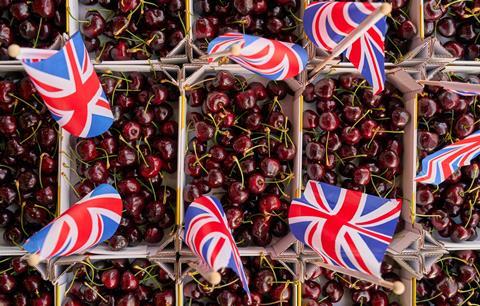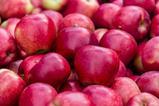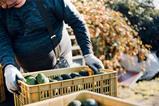Extended sunshine and improved growing techniques have transformed the British cherry industry, with production expected to reach 8,000 tonnes this year – four times the 2018 harvest

The UK’s largest supermarket chain Tesco says it expects British cherries to be more bountiful, bigger, sweeter and juicier this summer thanks to the recent warm spring, which delivered an extended period of sunshine and daylight hours.
In fact, the retailer is set to sell only UK-grown cherries from this week across all ranges except its Suntrail Farms brand, which will be 100 per cent British later in July.
And it plans to extend that local season with the addition of new early- and late-ripening varieties.
“The extra sunshine and daylight hours have played a major part in the quality of the fruit we’ve been sampling from around the country over the last few weeks and we know customers are going to be impressed,” says Tesco cherry buyer Olivia Amey.
“And it’s also meant that overall volume is up early in the season meaning that we’ll be able to meet the usual summer demand for cherries solely with British produce.
“We’re also working with UK growers to extend the season by looking at new varieties of both early and late ripening cherries that can deliver a classic British–grown taste – fleshy, firm, plump and fit to burst with a great juicy surge of sweetness.”
Tunnel vision
One of those growers is AC Hulme, based near Canterbury, in Kent, which says it is very optimistic about a UK cherry season that now lasts ten weeks – almost double to what it was just five years ago.
The UK cherry industry has apparently been transformed over the past two decades thanks to more and more British growers seeing better yields by using dwarf root stock, grafted onto new tree varieties.
These produce much smaller trees which can be grown in plastic tunnels, creating a micro-climate with temperatures similar to the Mediterranean and protecting the fruit from any inclement British weather.
And those new smaller cherry trees can now be picked by workers on foot rather than up ladders, a change that is said to keep the fruit competitively priced.
As a result, UK cherry production is once again thriving, with British growers set to produce an estimated 8,000 tonnes of cherries this year – around four times the harvest in 2018, and far above the 559 tonnes picked in 2015.
“The British cherry industry is moving at pace again now and new varieties are being brought in that are not only better suited to the British climate to improve quality and taste but also to help us extend the growing season,” comments AC Hulme’s managing director, Tom Hulme.
“Over the last few years we have brought in some exciting early season varieties such as Sweet Aryana and Grace Star as well as exploring later season cherries such as Kir Rosso which will extend the current season by an extra ten days.
“But there are several other innovations being used to extend the UK season such as controlling air conditions in storing rooms post-harvest to improve shelf life and also using different types of polytunnels to accelerate and delay ripening cherries through limiting sunlight.”
He adds: “Cherries are very susceptible to the weather and if it is too rainy or too humid the fruit suffers but the good news is that this year we have had pretty decent growing conditions and we are looking forward to a nice long season with the best quality fruit for several years.”








